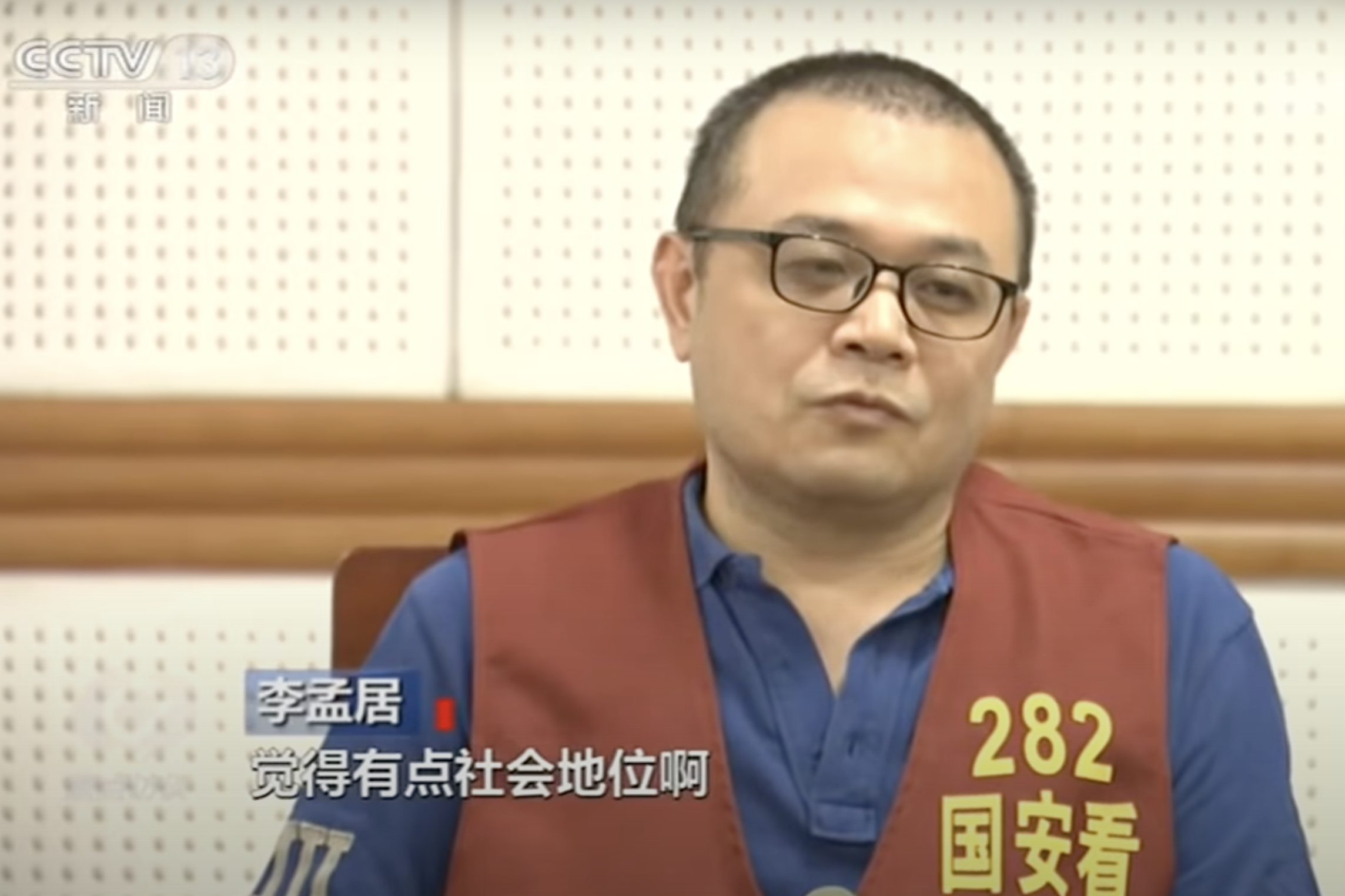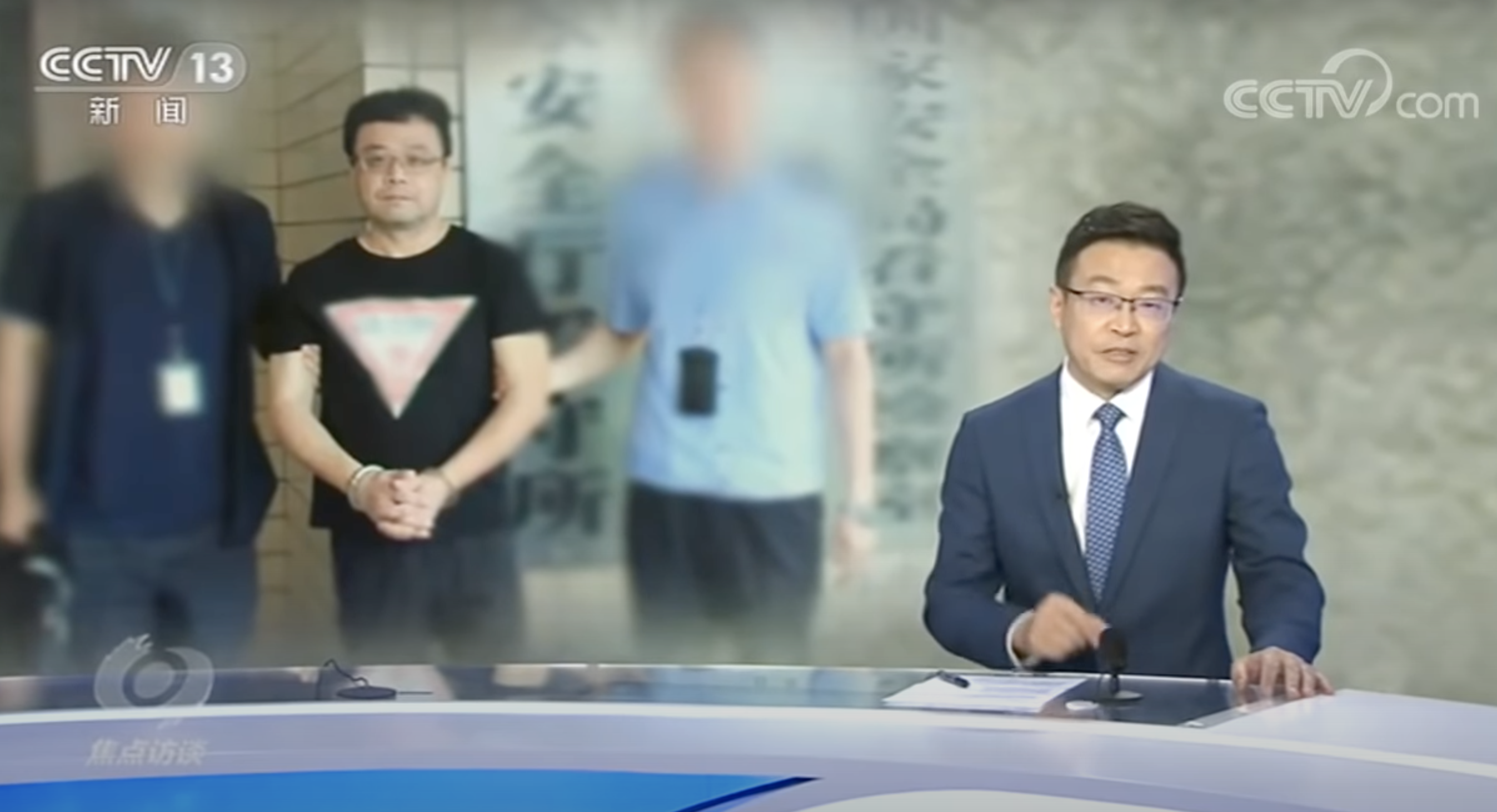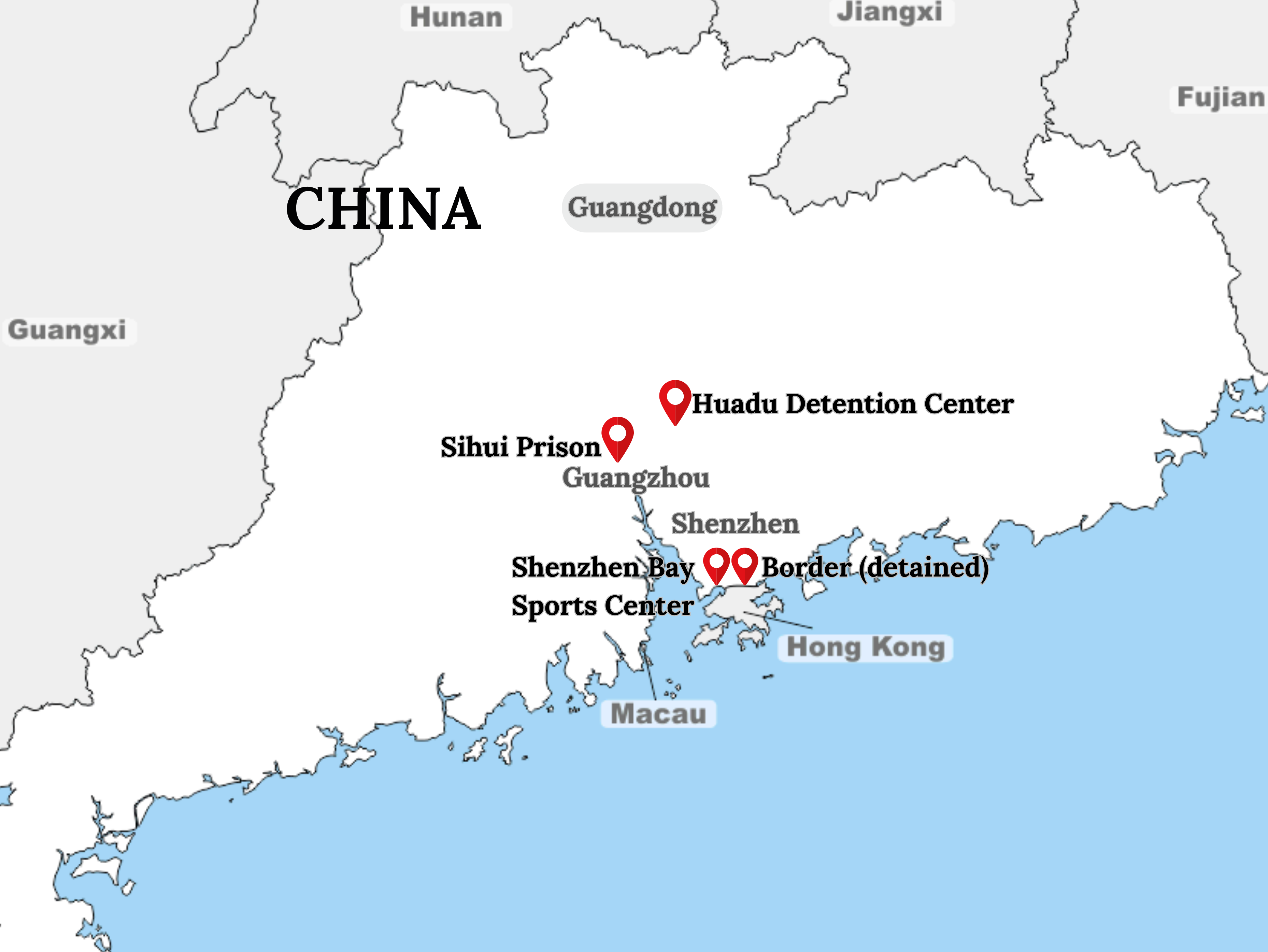China took aim at Taiwan with fake TV confession

This story is part two of the 2019 state-sponsored disappearance of Taiwanese businessman Meng-Chu Li (also known as Morrison Lee) in China. Part one is here.
- China’s forced TV confession of Meng-Chu Li was a crude attempt to attack Taiwan and warn it against voicing support for democracy in Hong Kong
- Beijing State Security lied to, and bullied, Li into making a fake confession on camera
- It took 7 or 8 takes until they were satisfied with his answers
- Party-state broadcaster CCTV-13 aired the confession in a 15-minute program rife with untruths
A little more than a month after his sham hearing in a Guangdong court in China in 2020, Taiwanese businessman Meng-Chu Li got some surprise visitors.
Two Beijing State Security officers had flown in from the other side of the country and were now sitting before him in an interrogation room.
“There was one man and one woman,” said Li. “They were impolite, loud and aggressive.”
And they had large TV-style cameras with them.
HEARING DONE BUT TRIAL NOT OVER
It was the end of July 2020 and Li was in Huadu Detention Centre in the outskirts of Guangzhou.
His lawyer had earlier persuaded him to plead guilty to charges of “spying and illegally providing state secrets to foreign entities”. The only evidence the police had were some photos on his phone of military vehicles he had taken in Shenzhen – some from the window of a central business district hotel where he was having breakfast and others from a public space.
Search for “深圳湾体育馆” (Shenzhen Bay Sports Centre) and “武警集結”(People’s Armed Police gathering) and there were thousands of other similar photos, some even published by Chinese state media.
Hardly state secrets.
His lawyer assured him that by pleading guilty he would not be sentenced to more than 1 year and 10 months in jail, and possibly as little as 1 year and 4 months. “If I didn’t sign it, the judges would be able to give me a longer sentence,” Li said, explaining that was what his lawyer had told him.
His hearing was on 15 June and he had signed his confession. The investigation phase of his case was long over. So what did state security police want with him now?
UNSCRIPTED BUT STAGED
Police had always used cameras to record Li’s previous interrogations. But they were small-sized cameras.
The ones the Beijing officers were operating were huge. The kinds you see in TV studios, remembered Li. “They looked like professional cameras.”
“This is a very important day for you,” they told him. They would record him and send the footage to their superiors in Beijing, and that recording could be used to “decide how many years you will be sentenced.”
Remember, this is one month after the court hearing. Li’s case should be the sole responsibility of the courts now, not the security apparatus.
From this threat and their subsequent line of questioning, Li thought they were planning to impose an additional charge on him related to supporting Taiwan independence.
“I was very scared,” he said, worried he would end up being sentenced much longer than the maximum one year and 10 months his lawyer had said.
There were no journalists that day in the interrogation room. Even so, Li knew about China’s TV confessions and was worried that he was about to be coerced into making his own. So, he requested their signed confirmation that no recordings would be made public.
But they refused, brushing him off by saying the footage would only be shown to their bosses back in Beijing.
In our 2018 study of China’s forced TV confessions, Scripted and Staged, police almost always use this lie, promising the recording is for internal use only. Later, of course, it is broadcast nationally, and sometimes internationally on CGTN, as “news”.
There was no script to learn that day, however. Unlike other forced confession victims, Li didn’t have to memorize his lines or read them from a teleprompter. Instead, the officers barked questions at him and he was guided into answering the way they wanted.
If what he said didn’t please them, they would retake the shot. For example, he wasn’t allowed to describe the Hong Kong protest he went to as a peaceful assembly.

When they got to questioning him about taking the photos of the military vehicles, they insisted that he say no one was there even though, Li said, it was a busy area with lots of people hanging about.
“They kept asking me to repeat that no one was there,” he remembered.
They asked him about his support for Taiwan independence, the Hong Kong protests, and the photos he took in Shenzhen.
“They were angry and rude,” he remembered.
Li said that he intentionally used the word “motherland” in one of this answers without being asked to, hoping to please the police officers and convince them he wasn’t pro-Taiwan independence.
Even though he does not view China as the “motherland” – few Taiwanese do these days - he was so frightened they would add the charge of Taiwan independence to his case and he would face years in prison that he added it to protect himself.
On a break between one of the takes, Li had an idea. He wanted to slip in a “secret” message in his “confession”. So, addressing the camera he said: “I think violence is absolutely wrong, it would be wrong in any democratic country, a serious mistake. Those who resort to violence must be brought to ‘justice’.”
The state security officers were pleased because they thought he was referring to the Hong Kong protesters but in his heart, Li was talking about those who abuse human rights being brought to justice.
In all, they made about seven or eight takes that day until the officers were satisfied.
WARNING TO TAIWAN

The video was eventually used more than two months later for a 15-minute current affairs show Focus Point on CCTV-13, a channel owned by Party-State broadcaster CCTV (the owner of international channel CGTN).
It aired on 11 October 2020, one day after Taiwan celebrates its annual Republic of China National Day.
And if the real target of the video – Taiwan -- wasn’t clear enough from the date, the warning at the end made it clear that Li’s confession tape was being used to threaten democracy-supporting Taiwanese.
The last few minutes contained a warning that pro-independence Taiwanese who violate Hong Kong’s national security law could be sentenced from three years to life in prison.
Li appears with a shaved head and wearing a maroon prison vest with the number 282. There is footage of him cuffed and marched between two police officers. Images meant to reinforce that Li is guilty.
He looks bewildered and off to the side for most of the footage.
His “lines” are typical of confession videos:
- Expressions of remorse. “I feel very sorry”.
- Admissions of guilt. “I made many mistakes and I hurt the ‘motherland”
- Motivated by fame or fortune. “I thought this would give me some prestige outside of my business work.”
FAKE ‘NEWS’

The program also contained several lies about Li and his case.
- By that point, Lei had already had his hearing, but the program did not report that and instead angling the program as an investigation.
- They described Li as the backbone of Taiwan United Nations Alliance (TAIUNA), an organization that campaigns on behalf of Taiwan’s UN membership. Li said he as only went to an annual fundraising dinner one year and was never involved in any of its events. Although, it’s worth remembering being a member of TAIUNA is not considered a crime in any democratic country!
- They said Li took a taxi across town twice from his hotel to scout Shenzhen Bay Sports Centre to take photos. But Li stayed in a hotel nearby and simply walked a few minutes to take a look.
- The program said the area where military vehicles were parked was fenced off and there were clear notices saying taking photos was prohibited. Li said it was a busy, open area with no signs and plenty of people walking around.
- The program claimed the photos were state secrets, yet made no reference to the fact that his photos were the same kinds of photos freely available on the internet, some of them hosted on Chinese state media websites.
‘THERE ARE SO MANY LIES IN THAT VIDEO…’
The day Focus Point’s program on Li came out – 11 October 2020 – he was still in detention, still waiting for his sentencing.
Every evening inmates are forced to watch xinwenlianbo, a daily CCTV news broadcast that goes out at 7pm. But not that week.
The TV in the detention centre was mysteriously broken.
“I thought to myself that maybe that video had been broadcast after all, or China had invaded Taiwan,” Li laughed.
Months later on 15 January 2021, Li finally had his sentencing – he was given one year and 10 months.
“I was shocked,” said Li. “Both me and my lawyer thought that I would get 1 year and 4 months” [the minimum length]. His lawyer later told him that Beijing National Security were not satisfied with his recorded confession and that they had requested judges give him 3 to 5 years, but prosecutors had insisted that any sentencing must stay within the original boundary, so judges gave him the maximum instead.
“I’m not sure that’s true, but it’s what my lawyer told me,” Li said.
After sentencing, Li requested to serve out the remaining months in prison, where conditions are usually a bit better.
On 16 March 2021, he was bussed to Sihui Prison, just southwest of Guangzhou. It was then that he first heard about his TV confession - one of the guards on the bus told him that he had seen him on TV.
But at that point, Li was so happy that he was outside the detention centre and could see the outside world – for the first time in more than a year - that he was in a good mood. “It didn’t affect me much,” he said.
After his release from prison, Li watched the confession video several times and each time it left him feeling upset and depressed.
“There are so many lies in that video,” he said. “I makes me feel down to watch it and I don’t want to see it again.”
Campaign against CCTVs forced confessions
Safeguard Defenders has successfully campaigned to have CGTN, CCTV’s international channel, banned in several western countries arguing that airing forced confessions violates fundamental human rights including the right to a fair trial, the right not to incriminate oneself and the right to human privacy and dignity. The UK, Australia and several European countries have removed CGTN and CCTV-4 from their airwaves.
For more on this campaign please search for CGTN on our website or click this post and here for our report Scripted and Staged on China's forced TV confessions.